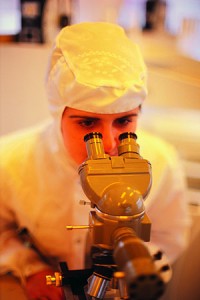Cholesterol challenges? Google “guggul”

Guggul is an Ayurvedic herb, used in India since 600 B.C., that is derived from the sticky resin of the guggul tree.
by Connie Cagley —
If you are experiencing challenges with your cholesterol levels, try a Google search for guggul (pronounced goo-gall). You will find that guggul (Commiphora mukul) is an Ayurvedic herb, used in India since 600 B.C., to treat arthritis, inflammatory conditions and a variety of lipid disorders. It has received much attention in recent years, specifically for its cholesterol-lowering properties.
A little information may be helpful when trying to sort out cholesterol concerns. Cholesterol is not all bad, as some forms are used by the body to build new cells, produce sex hormones, insulate nerves and digest fat. Most cholesterol is produced by the liver; the rest comes from food such as meats, eggs, milk and cheese. The problem arises when the body is unable to use or eliminate excessive supplies of cholesterol.
Cholesterol is a form of lipid or fat that moves through the bloodstream attached to proteins, the two substances forming complexes called lipoproteins. There are two major types of cholesterol: the low-density lipoproteins (LDL) and the high-density lipoproteins (HDL). LDL, often referred to as “bad” cholesterol, is the major form in which cholesterol is carried into the blood and is a major cause of arterial blockage, due to the harmful fatty buildup it creates. HDL, the “good” cholesterol, on the other hand, helps clear excess LDL cholesterol from the bloodstream and returns it to the liver for recycling, converting it into bile acids. Difficulties occur if too much bad cholesterol builds up over time and becomes trapped on the arterial walls, forming plaque.
The herb guggul (also sometimes spelled gugul, gugulu, or guggal) is derived from the sticky resin of the guggul tree, native to India. [A notable aside: it is a relative of another tree, Commiphora myrrha, or myrrh, made famous for its role as a gift from the Wise Men.] In the early 1960s, Indian researchers discovered an ancient Sanskrit medical text that appears to clearly describe the symptoms and treatment of what we would consider high cholesterol. One of the main recommendations was the use of guggul.
Interest in guggul’s purported ability to lower cholesterol levels has generated many research studies across the globe. Animal studies suggest that guggulsterones can increase the liver’s ability to bind bad LDL cholesterol, thus removing it from circulation. Animals given guggul extract and a high-fat, plaque-producing diet had lower levels of blood fats and developed less atherosclerosis than animals given the diet alone.
In humans, three months of guggul treatment resulted in lower levels of total cholesterol (average 24 percent) and serum triglycerides (average 23 percent reduction) in the majority of patients.
A double-blind trial comparing guggul to the cholesterol-lowering drug Clofibrate found that the two treatments were very similar in their ability to lower total cholesterol (11 percent by gugulipid, 10 percent by Clofibrate) and triglycerides (17 percent by gugulipid, 22 percent by Clofibrate). HDL (good) cholesterol increased in 60 percent of patients, while Clofibrate did not have any effect on HDL. Raising HDL and lowering total cholesterol improves the ratio of these blood fats.
An important consideration is that Clofibrate may cause liver damage, whereas guggul does not appear to have any deleterious effects on the body. A three-month trial period of taking guggul is generally recommended, either in capsule or extract form, in order for the herb to maximize its potential and the consumer to experience results.
Guggul’s ability to effectively deal with arterial plaque is well-documented. However, guggul has one more surprise benefit that may be of additional interest. Anecdotal evidence exists linking the use of guggul in a liquid extract form, with a significant reduction in plaque on the teeth.
Who can resist the possibility of not only reducing your cholesterol, but also potentially reducing your visits to your dental hygienist? Google guggul and decide for yourself.
Connie Cagley, Ed.D., M.H., along with her husband, Guy Devin, Ph.D., were owners of Conscious Light Botanicals, an herbal botanical store. consciouslight.com.
Reprinted from AzNetNews, Volume 23, Number 1, February/March 2005.





June 8, 2015
Cholesterol, Featured, Herbs